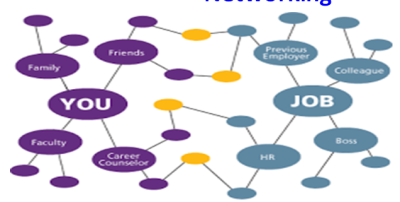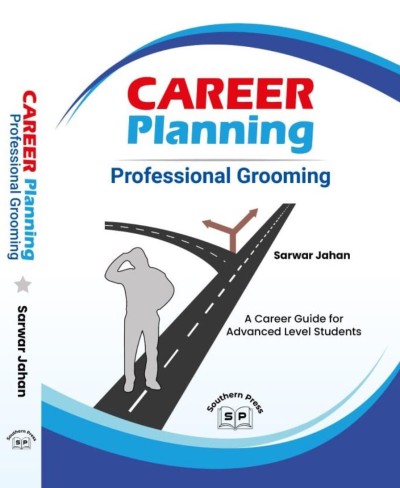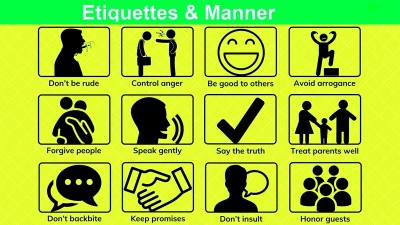Course description
A strong, rigorous academic component must complement the work experience. Internships are an opportunity to apply A group of professionals linked each other, who know each other, who can provide guidelines, support, advice about career and the job market. They can help you with the majority of jobs that are never advertised. For this reason, networking needs to be an integral part of job search. The benefits of networking include learning more about career options, increased visibility within the field, propelling your professional development, finding suitable mentors, increasing chances of promotion and perhaps finding the next job. Though initially, may feel uncomfortable about the notion of networking, it is a skill that can be learned and mastered by following the practical guidelines. Start by networking with people you know such as family, friends, faculty, students, community members, service professionals, alumni, and neighbors
Networking Defined
A professional network can be defined as people you know who can provide leads, support, and advice about careers and the job market. They can help tap the overwhelming majority of jobs that are never advertised. For this reason, networking must be an integral part of job search. The benefits of networking include learning more about career options, increased visibility within the sector , propelling your professional development, finding suitable mentors, increasing your chances of promotion and maybe finding your next job. Though initially, you'll feel uncomfortable about the notion of networking, it's a skill which will be learned and mastered by following the sensible guidelines below
Start by networking with people you recognize like family, friends, faculty, students, community members, service professionals (doctors, dentists), alumni, and neighbors. Talk to them about what you would like to try to do. Ask whether or not they know of any companies or organizations doing the kinds of things that interest you. Do they know of anyone during a related area of labor or study whom you would possibly talk to? Networking etiquette requires that you simply don't invite employment. The focus of networking is to satisfy many of us in your field and determine more about the roles they are doing.This is how you get to see firsthand the type of company and work that you really want to do. The art of informational interviewing is in knowing the way to balance your ultimate agenda (to locate a job) with the unique opportunity to find out firsthand about the stress of your field. Always approach the experience as posing for advice instead of trying to find work. Be courteous and professional in the least times, even together with your aunt’s ally. Never abuse your privilege by posing for employment, but execute your informational interviews skillfully, and employment may follow.What does networking mean?Networking is the act of making connections, whether it is with people, companies, or organizations. As a creative arts student, you should always be looking out to create opportunities with the aim of extending your professional networks.
Why Networking :
NETWORKING is the single most powerful marketing tactic to accelerate and sustain success for any individual or organization! “It’s Not What You Know - Its Who You Know!” Simple But Effective Concept of Networking Creating Links From People You Know To People They Know Exposure To Maximum Opportunities. It is a process that fosters the exchange of information and ideas among individuals or groups that share a common interest
Types of Networking: (i)Business and (ii)Social– Goal: Building of relationships– Business: The objective is to form relationships that will improve organizational success or become employed
The Law of 250
Every person knows at least 250 other people. Each of your contacts knows at least 250 people. So that’s 62,500 at your 2nd level. Each of your 2nd level contacts knows 250 people - and that’s over 15,000,000!
n Family/Friends
n Friends of Family/Neighbors
n Classmates/Alumni
n Contacts from Special Interest Groups (e.g., Rotary, Lions, Student organizations)
n Members of your religious congregation
n People dependent upon networking (e.g., realtors, insurance agents)
n Former employers/co-workers
n Recruiters/employers who give presentations on campus.
n Other job candidates
n Professional Associations
n Contacts in the Career Center
Former teachers, current professors, and staff
Why Networking is important?Networking for Professional Development. Networking can be vitally important to your career, you can never be sure who you will meet at various events, it is therefore always best to be prepared to either gather contact information or pass yours on. Finding jobs through the people you meet is very common in the creative industries, so get yourself out there!
How to do it?There are many ways that you can as a creative arts student can start to network. The following are a few networking examples to help get you started.
· Your peersYou may not have realized but you are already part of a large network of creative people, whether it is students, tutors, lecturers or technicians. Tutors, lecturers, and technicians, in particular, will most likely have plenty of contacts, some of which may have shown an interest in recruiting graduates.
· Subject-specific organizationsEach area of the arts has its own organizations, nearly all have a strong following of like-minded individuals with a wealth of knowledge. The following is a small number of organizations that you could opt to join. Some have a membership fee so you should be clear of what is being offered before joining.
· Community WebsitesThere are plenty of community websites related to your specialism on the internet, they do vary in quality, so you should be sure to check out what you’re signing up to.
· Competitions and ShowsCompetitions often have shows after them, which entrants or winners can attend. These types of gatherings attract industry professions who are often seeking to recruit creative talent, only by participating can you be noticed.
· Work Experience / VolunteeringThese are obvious to gain contacts which you can use when you start looking for work. The company you worked for may well employ you again, or be able to provide you with information regarding possible work opportunities.
Useful toolsThere are many things that can help you network. These are:
· Business CardsBusiness cards are a very useful way of passing on your details to people that you meet at events you attend. You should carefully consider its design, as it is often the very first item of promotion material people will see.
· Mobile PhoneYour mobile phone is your primary form of contact in most cases, if you give it out you should make sure that the answerphone message is appropriate.
· EmailIf you are giving your email out to individuals or companies it wise to have an the email address that looks professional, if possible have an email that is attached to your website, avoid using your personal email if it has a peculiar name.
Identify Your Network
Start by listing everyone you know who is a potential prospect.
• Family (parents, siblings, uncles, aunts, cousins)
• Friends
• School contacts (faculty, teachers, classmates, alumni)
• Community associates (religious affiliates, neighbors)
• Work contacts (supervisors, coworkers)
• Professional associations, industry receptions, career fairs
Building your network
Current network – you already have one!friends, family,contacts from voluntary work, societies/clubs Part-time work, internships workExpand your network by:Attending careers fairs, employer presentations, conferencesAlumni servicesAsk people you know for other contactsJoin professional associations (student membership)Study abroadOnline networkingNetworking as a Student: Clubs/Organizationsn Be an active membern Reach out to other schools with the same/similar clubn Take advantage of conferencesn Aim for leadership positionsn Reach out to alumni networksn Stay informed about regional/national eventsn Connect with brothers/sisters in the field you are interested inn Take advantage of connections other members may have
Benefits of networking
The benefits of networking include learning more about career options, increased visibility within the field of choice, propelling professional development, finding suitable mentors, increase chances of promotion, and maybe look for the next job. It’s a skill which will be learned. Start by networking with known people like family, friends, faculty, students, community members, service professionals, alumni, and neighbors.
Prepare and Practice Script
Prepare a brief introductory script. This should be a one-minute summary of self-interests, goals, and needs right now. Practice by telling as many people on the above list as possible. Once are comfortable with ‘pitch’, start asking if they know of anyone they should contact. Then start contacting these people by phone or email. A script will sound something like this:
“I am in my junior year at Southern University and have a particular interest in Administrative position/Engineering Logistics. I hope to ultimately apply my degree to the legal field/marketing/sales/product and inventory management. Right now I am trying to learn more about the actual experience of people working in these areas. Could you spare some time to speak with me about the current trends and opportunities in this field?”
“My name is Laboni Chaiti. I am due to graduate from Southern University in 6 months' time. I received your name from your company’s webpage.
I am studying Business/Law/IT/Engineering/English/Pharmacy.” Looking for your kind cooperation.
Career Fairs/Company Presentations
Career Fairs are an excellent way to connect with probable employers. Many professional groups hold public career fairs which are advertised through media. This is an incredible chance for bachelor's degree holders to satisfy prospective employers. Career fairs should be only one small part of the entire job search process; however, they will be a more successful part.
Keys to Career Fair Success
Research: Find the companies and organizations that you are interested in and check if any new companies have registered. Take time to survey the layout of the fair and determine where “ideal” employers are located.
Resumes: Keep good number resume—at least two for every organization.
Attire: a professional look is very important, Conservative business attire is essential. Know the expected attire and dress accordingly. It is always better to be overdressed than underdressed.
Be Proactive: You may only have three minutes to market yourself so be sure to make the most of your time.
Be Proactive: Very limited time to market. Only a few minutes to make the most of your time.
Start with the basics: approach the corporate representative in a friendly manner, make good eye contact, offer a handshake, and show interest. Give self-introduction in a brief and prepare some questions just as would be for any employment interview. The most ordinary question may face like “what are you here for today?” A follow-up question for you to ask is, “What do I need to do to obtain the next interview with your company?” Get a business card or contact information for representatives of the companies that interest you.
Follow-up: There are two main methods of follow-up. Some suggest calling the recruiter within a day or two of the fair and leaving a voicemail message thanking the recruiter again for his/her time. Another tactic would be to write a thank-you note/email and send it the next day to the address on the recruiter’s business card. The content of the note should include thanking the recruiter for his/her time and restating your interest and qualifications for the position.
Follow-up: Methods of follow-up. Some suggest calling the recruiter within a day or two of the fair and send a message thanking the recruiter again for his/her time and restating interest and qualifications for the position.
Questions to Ask Employers at a Career Fair
Questions should be natural. Before asking questions, introduce yourself and establish rapport with the corporate reps. Listen carefully to their answers. Be courteous and make certain to thank them before closing the conversation. Try to not ask questions that would easily be answered by the company’s website (e.g., what does your company do? Who is the owner of the company?).
These are intended as examples of kinds of questions you could ask.
1. Where will you typically work in the company?
2 What do you do at your company?
3. How long have you worked there?
4. Does your company hire on a continual basis or only at certain times of the year?
5. How long does your hiring process take?
6. What are the most important qualifications your company looks for in an employee?
7. Are there particular personality traits you look for?
8. What are your company’s major goals in the next few years?
9. Are graduate degrees important? In what areas within your company?
10. What kinds of courses do you suggest in order to be a successful candidate?
11. Is there a GPA cut-off for your recruiting process?
12. What kinds of entry-level positions exist within your organization that would be open to someone with my background?
13. As an entry-level employee, what kind of career advancement opportunities would be open to me in two, or five years from now?
14. How many years do entry-level employees typically work for your company?
15. Do you expect employees to relocate?
Professional Associations
Professional Associations can be an excellent resource for job seekers. Through their various activities and services (meetings, conferences, publications, websites, etc.) professional associations provide information about career fields, job opportunities, and employers in the professions they serve. They can be particularly helpful if you need to create a long-distance network to help you conduct a long-distance job search.
Act Professionally!
· Be polite, respectful, and charming!
· Dress professionally for in-person meetings.
· Have 10-15 appropriate questions ready to ask for a half-hour conversation.
· Be prepared for the person to ask you about your interests and experiences.
· Be respectful of the person’s time and keep the conversation short; they will let you know if they have additional time to share.
· Say “Thank You” at the conclusion of your conversation!
Networking & Social Media
Social Media is Networking Extensions but Not Replacements for Personal Networks. You're probably using social media already. Most students have Instagram, Tik Tok, Face book page, and more and more are using Twitter and other sites to connect. As you start building the knowledgeable network, it is time to require a step back and believe in social media and the way you employ it as a networking technique.
Grow Professional Network Socially
Nowadays, just about every individual and organization have a social presence. This makes it a powerful resource for career and network development. While your previous use of social media may have been more — well, social — in nature, that is only the beginning of what these platforms have to offer.
· LinkedIn. From alumni search tools to networking among professionals, LinkedIn provides numerous tools for young professionals.
· Build your network as you go. Fellow students, teachers, family, friends and others can be valuable connections down the road.
· Find organizations that are interested in. With minimal effort, you can learn a great deal about an organization's products, services, news, and culture.
· Identify thought leaders. Analyze the topics and trends. Follow them and make an effort to connect. Be sure you are clear on why you are reaching out.
Share the content of your own.
Your interactions with organizations can be passive (following)
· status updates and tweets) and active (replying, re-tweeting or starting, or joining conversations). Wise engagement can help you get noticed. Just be sure natural enthusiasm doesn't border into the realm of spam
Networking Tips & Techniques
Develop Good People SkillsAssert yourself positively and confidently.Ask good questions.Be a good listener.Be viewed as knowledgeable or skillful in a particular area.Show interest in being of assistance to others.What Not To Do:
Do not ask for a job or internship (ask for advice, information, and other contacts).Do not spam with multiple e-mails or stalk with multiple phone calls.Do not act unprofessionally or negatively.Do not share their contact information with others unless having permission to do so.


















